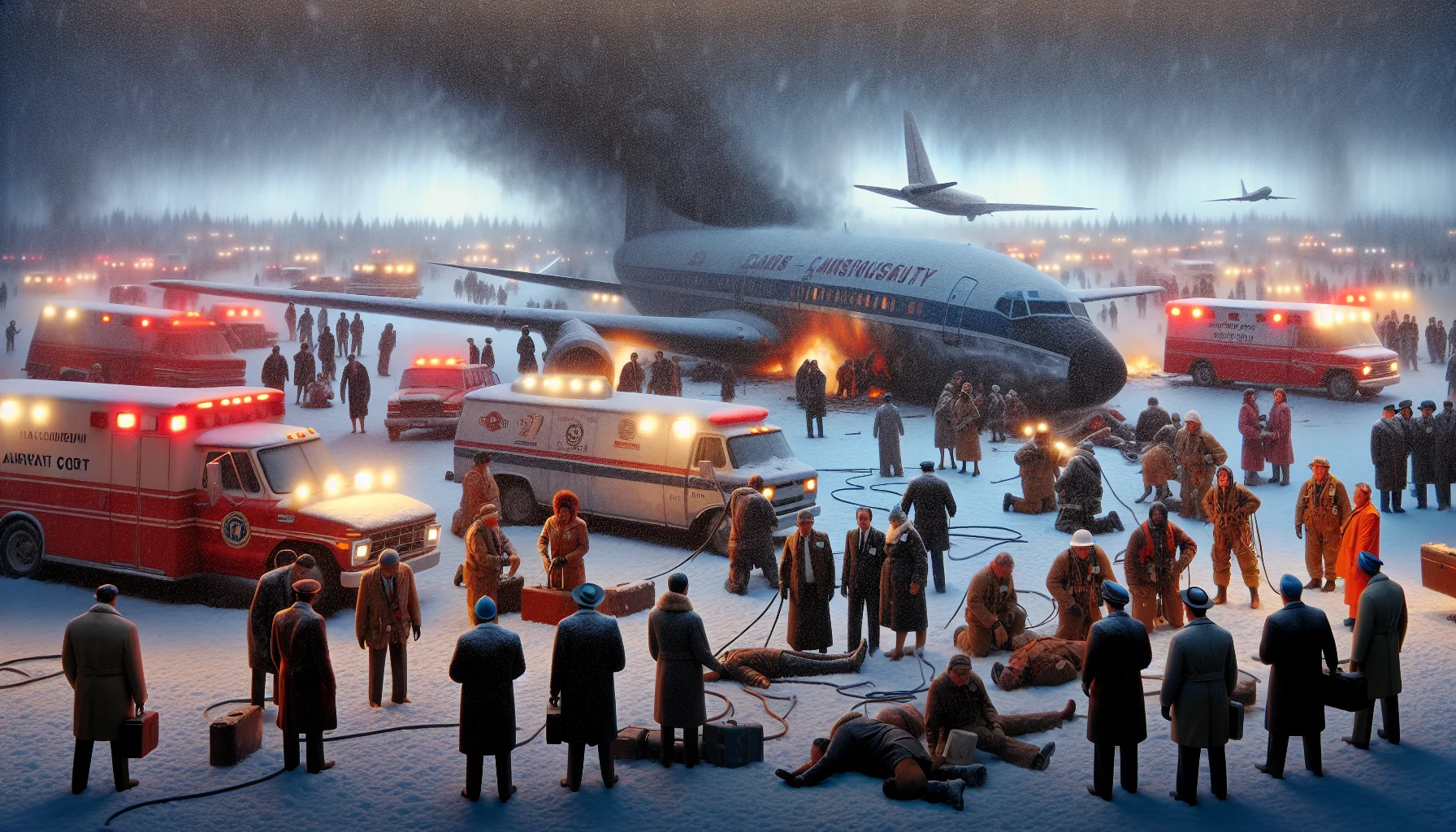
The Munich Air Disaster
by: The Calamity Calendar Team
February 6, 1958
The Rise of the "Busby Babes"
In the mid-1950s, Manchester United Football Club was soaring. Led by the charismatic Matt Busby and endowed with a roster of youthful, talented players called the "Busby Babes," they captured the imagination of fans worldwide. This team embodied the promise of a vibrant future, blending youthful vigor with burgeoning football prowess, and was a testament to Busby's vision for nurturing young talent. As the club advanced through the intricacies of international competition, it seemed destiny was firmly in their grasp.
The European Cup of 1958 saw Manchester United aggressively competing, and their recent victory over Red Star Belgrade had placed them on the brink of international glory. Spirits within the team ran high as they boarded British European Airways Flight 609, buoyed by their success. On February 6, 1958, their journey home was interrupted by a scheduled stop at Munich-Riem Airport for refueling, a routine part of the return trip that would soon turn catastrophic.
The Day of the Disaster
The afternoon sky over Munich was bleak, laden with snow, and fraught with deteriorating weather conditions. As Flight 609, a twin-engine Airspeed Ambassador, prepared to resume its journey, an air of joviality and casual camaraderie enveloped its passengers. However, beneath the surface-friendly façade, technical challenges began to brew.
The drama unfolded at precisely 15:04 CET with two aborted take-off attempts. Issues with "boost surging" in one of the engines grounded the flight momentarily, a clear indication of the struggle against both mechanical and meteorological odds. The aircraft crew, determined to press on, awaited another opportunity to break free from the clutches of the snow-battered airport.
With conditions growing no less challenging, the crew decided at 15:31 CET to attempt a third take-off. The plane hurtled down the runway, engines roaring against the weather's relentless grip. However, unseen enemies—snow and slush—conspired beneath them. Barely gaining the necessary speed to lift off, the aircraft faltered, skidding disastrously off the runway. What followed can only be described as chaos: The plane collided with a nearby house, fire erupting amid the wreckage like a pitiless specter of loss.
Fire and Ashes: Immediate Moments After Impact
The moments following the crash were marked by an astounding surge of human spirit and desperate survival. With flames threatening both lives and what remained of the aircraft, passengers and crew alike scrambled to safety, some pulled from the blaze by the grace of luck and the bravery of their rescuers. The local emergency services, racing against time, converged upon the scene with commendable speed. But the scale of the destruction proved heart-wrenching.
Thanks for subscribing!
The casualty list reads like a somber ode to a future unfulfilled. Among the 23 souls lost were eight eagerly-storied Manchester United players, leaving their teammates and the entire sporting world in shock. Distinguished journalists and club staff who had chronicled and contributed to United's rise were now silent. The disaster claimed two crew members, inextricably linked by fate to the tragedy they've valiantly tried to avert.
The Aftermath: An Unspeakable Void
As news of the crash reverberated through communities in Manchester and beyond, mourning spread with inescapable weight. Vigils cropped up, public expressions of collective grief intermingled with disbelief. Meanwhile, for the surviving team members and their manager, Matt Busby, the days that followed were mired in emotional and physical recovery.
In the hushed halls of Munich's Rechts der Isar Hospital, the severely injured clung to life. Here, a remarkable narrative began to unfurl among those fortunate enough to survive. Manager Matt Busby and player Bobby Charlton, despite severe injuries, epitomized triumph over adversity in their eventual return to football. Yet, for many fans, the shadow of the Busby Babes would etch an indelible mark on hearts and memories.
A Legacy of Change
Beyond the immediate and human tragedy, the Munich Air Disaster ushered in significant reevaluations in aviation safety. The precise cause of the crash—detrimental slush on the runway—prompted global changes in how conditions like snow and ice were assessed before takeoff.
Moreover, the reverberations reached into the fabric of Manchester United itself. The team had to regroup and rebuild from the depths of loss. Under Busby's resolute guidance, the club pursued an obsessively reimagined version of excellence. This dedication paid dividends a decade later when United clinched the European Cup, a redemption that honored the fallen.
Remembering the Unforgettable
Today, the Munich Air Disaster stands not merely as a chapter in sporting lore but as a tale of resilience and remembrance. Annual commemorations pay homage to the victims, reminding generations of the cost of progress borne on shoulders of young men.
Museums, documentaries, and a dedicated memorial at Old Trafford in Manchester perpetuate the continuum of memory. Survivors like Bobby Charlton became towering figures in the world of football, embodying a legacy tied to that fateful day. The resonating phrase "Forever Remembered" serves as a beacon that honors those lost while nurturing the spirit they epitomized.
While technological shifts and time itself may alter how we view history, the essence of February 6, 1958, endures, an echo of the eternal dance between human aspiration and the ungovernable forces of chance. In honoring the lost, the Munich Air Disaster remains a poignant reminder of our shared humanity and the fleeting, yet profound, impact of dreams interrupted.
Stay in the Loop!
Become a Calamity Insider and get exclusive Calamity Calendar updates delivered straight to your inbox.
Thanks! You're now subscribed.